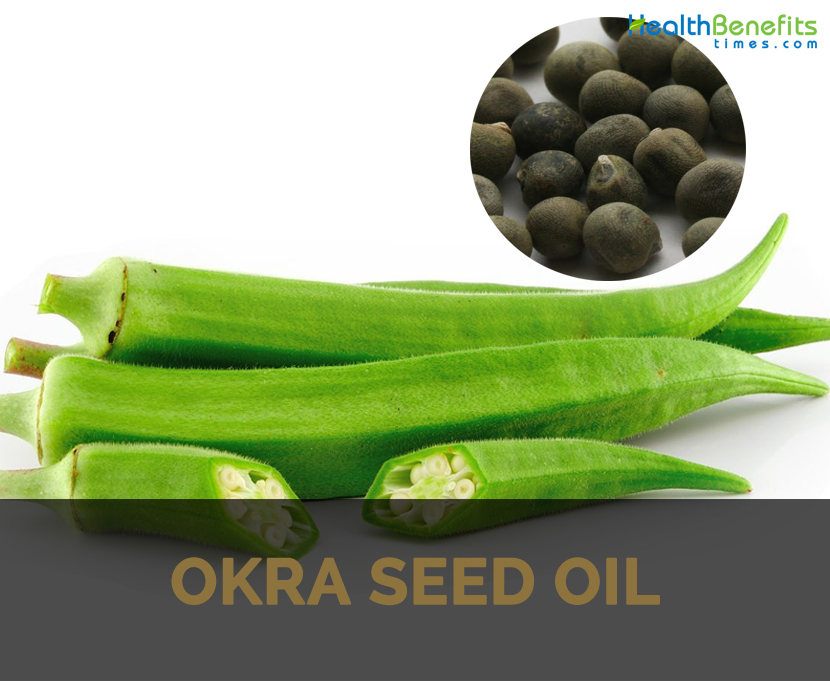| Okra seed oil uses and benefits Quick Facts | |
|---|---|
| Name: | Okra seed oil uses and benefits |
| Scientific Name: | Abelmoschus esculentus |
| Origin | It is widely grown in West Africa especially Nigeria. It was originated in Ethiopia and was propagated by 12th century BC in North Africa, Arabia, Mediterranean and India. |
| Colors | Bright yellow with greenish tinge |
| Name | Okra seed oil uses and benefits |
|---|---|
| Scientific Name of Okra | Abelmoschus esculentus |
| Native | It is widely grown in West Africa especially Nigeria. It was originated in Ethiopia and was propagated by 12th century BC in North Africa, Arabia, Mediterranean and India. It |
| Common/English Name of Okra | Lady’s finger, Gumbo, Ochro , Bamia pod |
| Name in Other Languages of Okra | England: lady’s finger; USA: gumbo; Portuguese: guibeiro; India: bhindi; Thailand: krajiab kheaw; South East Asia: okra plant, okoro, ochro, quimgombo, gombo, quingumbo, kopi, kacang bendi, arab, bhindi; Middle East: asbamia, bamieh, bamya; Angola: quiabo; Cuba: quimbombo; Sweden: mbinda, mbamia; Taiwan: qiu kui; Croatian: jedilna oslez; Danish: okra; Greek: Bamia, bamies; Hebrew: hibiscus ne’echal, bamiya; Hindi: bhindee, bandakai, dheras, vendakai; Hungarian: bámia, gombó; Italian: gombo, bammia d’egitto, ocra, corna di greci; Japanese: amerika neri, okura, kiku kimo; Khmer: pôôt barang; Korean: oh k’u ra; Laotian: khüa ngwàng; Malay: bendi, kacang lender, kacang bendi, sayur bendi , kachang bendi, kacang lendir, kopi arab; Norwegian: grønsakhibisk; Polish: ketmia jadalna, czyli okra; Portuguese: gambô, quibombô, quiabo, quibombó; Romanian: bame; Russian: bamiia; Sanskrit: tindisa; Spanish: gombo, quimbombo, ají turco, ruibarbo, ocra; Tamil: vendaikkaay; Thai: krachiap, krachiap khieo, ton krachiap, bakhua mun, krachiap mon; Turkish: bamya; Urdu: bhindii; Nepali: van lasun (वन लसुन); Manipuri: Belendri; Albanian: bamje; Basque: okra; Belarusian: okra (окра); Bosnian: okra; Bulgarian: bamya (бамя); Catalan: okra; Croatian: okra; Czech: okra; Danish: okra; Dutch: okra; Estonian: okra; Finnish: Okra; French: gombo; Galician: Quiabo; German: Okra; Greek: bámia (μπάμια); Hungarian: gombó; Icelandic: okra; Irish: okra; Italian: gombo; Latvian: Okras; Lithuanian: okra; Macedonian: bamja (бамја); Maltese: Okra; Norwegian: okra; Polish: róża chińska; Portuguese: quiabo; Romanian: okra; Russian: okra (окра); Serbian: okra (окра); Slovak: okra; Slovenian: Bamija; Spanish: okra; Swedish: okra; Ukrainian: okra (окра); Welsh: ocra; Yiddish: okra (אָקראַ); Armenian: okra; Azerbaijani: bamya; Bengali: Akarā (অকরা); Chinese: Qiū kuí (秋葵); Georgian: okra; Gujarati: Ōkarā (ઓકરા); Hmong: okra; Kannada: Beṇḍekāyi (ಬೆಂಡೆಕಾಯಿ); Kazakh: Bamïya (Бамия); Khmer: okra; Korean: okeula (오크라); Lao: phik (ພິກ); Malayalam: okra; Marathi: Bhēṇḍī (भेंडी); Mongolian: chukhal kheregtseetei (чухал хэрэгцээтэй); Myanmar (Burmese): ronepatesee (ရုံးပတီသီး); Nepali: okra; Sinhala: baṇḍakkā (බණ්ඩක්කා); Tajik: okra; Tamil: okra; Telugu: Ōkrā (ఓక్రా); Thai: Mak̄heụ̄xmxỵ (มะเขือมอญ) Uzbek: Bomiyon; Vietnamese: đậu bắp; Arabic: bamia (بامية); Turkish: bamya; Afrikaans: okra; Chichewa: there’re; Hausa: okra; Igbo: okra; Sesotho: okra; Somali: okra; Swahili: bamia; Yoruba: okra; Zulu: okra; Cebuano: okra; Filipino: okra; Indonesian: okra; Javanese: okra; Malagasy: okra; Malay: bendi; Maori: okra; Esperanto: okra; Haitian Creole: kalalou; Latin: okra |
| Extraction method | Solvent extraction method |
| Color | Bright yellow with greenish tinge |
| Odor | Fragrant |


